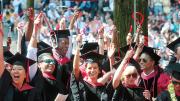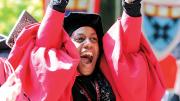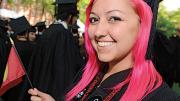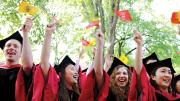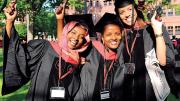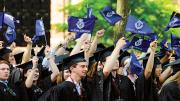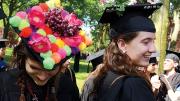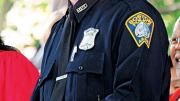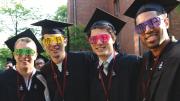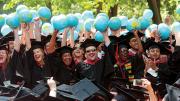There were frost warnings for northern and western Massachusetts on Memorial Day eve, and snow fell on Mount Greylock. But by Commencement eve, at the honorands’ dinner in Annenberg Hall, President Drew Faust hoped, uncharacteristically, for a few clouds to dampen the forecast turn in the weather; she even wondered aloud whether undergraduates would wear clothes under their gowns. Thursday morning, a summer heat wave settled clammily upon the Commonwealth: umbrellas were wielded to ward off the sun. The symbolism seemed almost too broad, in a year when Harvard swung between low points and high.
The Administrative Board probed undergraduate academic misconduct on an unprecedented scale—dozens of students were sanctioned. Concern about leaks from that inquiry led to investigations of resident deans’ e-mail accounts, punctuated on May 28, minutes before the Phi Beta Kappa literary exercises, by the announcement that Harvard College dean Evelynn M. Hammonds was stepping down (see page 52). The campus calendar was battered by Superstorm Sandy, a blizzard, and the manhunt that locked down the metropolis after the Boston Marathon bombing (an act of terror that took the life of a University staff member’s daughter—see page 59).
But undergraduate House renewal began. Plans were made, finally, for an academic commitment to Allston (to be the School of Engineering and Applied Sciences’ new home). Scores of faculty members engaged in ways to enhance learning and teaching, and dozens in the experimental online-course platform (see pages 48 and 50). The men’s basketball team won its first NCAA tournament game, defeating New Mexico—and prompting Latin Salutatorian Fanaye Yirga ’13 to utter the immortal phrase, “…illam unicam cladem gloriosam Novorum Mexicanorum!” (“… that single glorious defeat of those in New Mexico!”). Stupendous eight- and nine-figure gifts were announced to support some of these priorities, and others like biomedical engineering—a harbinger of more to come as The Harvard Campaign lifts off this fall.
Sober Sentiments
The formalities of the 362nd Commencement reflected the temper of the times. President Faust’s baccalaureate address, on Tuesday afternoon, made the only official mention of the cheating controversy (the year “began with revelations about breaches of academic trust and raised hard questions for all of us. What is success? What is integrity? How do we uphold it, in our own lives and as a community?”). But mostly she drew on Boston’s heartbreaking reprise of New Yorkers’ heroism on 9/11, with first responders dashing to the danger: she talked with the seniors about “lives of running toward,” impelled by “something larger than yourselves, lives of engagement and commitment and, yes, risk—risk taken in service to what matters to you most.” (She might also have been channeling Facebook COO Sheryl Sandberg ’91, M.B.A. ’95, best-selling author of Lean In, who keynoted Harvard Business School’s half-century celebration of co-educating the M.B.A. program—see page 55.)
The contemporary theme carried over to the morning exercises. Third-generation Boston police officer Stephen McNulty led the singing of the national anthem. Faust then came forward to ask for a moment of silence for the victims of the Marathon bombing and of the recent Oklahoma tornadoes (cataclysms manmade and natural that prefigured her afternoon remarks on the purposes of research universities; see page 47). The McNulty family’s tradition of service mirrors that of Jon Murad ’95, the graduate English speaker. The mid-career M.P.A. recipient signs his e-mails, simply, “Detective, NYPD/Harvard Kennedy School ’13” (see page 47). New York and Boston, fierce rivals in sports and other realms, are now bretheren among American cities on the receiving end of terrorism.
During the conferral of degrees, Provost Alan M. Garber made note of three people who have served Harvard: Graduate School of Education dean Kathleen McCartney, appointed president of Smith College; Michael Shinagel, dean of continuing education and University extension, retiring after a record-setting tenure; and the College’s Dean Hammonds.
Significant public-sector service was also recognized in the conferring of an honorary degree on Boston’s street-savvy mayor, Thomas M. Menino, who is concluding 20 years in office, an era of robust growth in the local healthcare, high-technology, higher-education, innovation-driven economy—all aligned with Harvard’s aspirations, particularly on the mayor’s side of the Charles River. Cleverly echoing the rallying cry that helped knit Boston together after the bombing, his citation lauded a leader “whose love of his city and passion for its betterment have made and kept Boston strong.”
Outside Tercentenary Theatre, and before Commencement proper, most of the week’s guest oracles were similarly high-minded and serious. Law School class day speaker Jeffrey Toobin ’82, J.D. ’86, legal analyst for The New Yorker and CNN, addressed the Supreme Court’s changing composition. He noted the retirement of associate justices John Paul Stevens, Sandra Day O’Connor, and David Souter ’61, LL.B. ’66, LL.D. ’10, observing that no one is likely to see “three more different people” than that trio, yet, “all were moderate Republicans who left the Court completely alienated from the modern Republican party.” He explained that “the notion of moderate Republicanism has disappeared from the Supreme Court, just as it has from American life.” Toobin’s characterization of today’s court was sobering: a body “that now has five Republicans and four Democrats—and that tells you most of what you need to know.” (Phi Beta Kappa orator Linda Greenhouse ’68, another distinguished Supreme Court reporter, touched on these issues as well; see page 44).
Both the Education School and Kennedy School speakers focused on children and learning. At the former, activist and civil-rights pioneer James Meredith emphasized the role of faith and religion in education, and slightly recast the parable of the Good Samaritan. He said the religious leaders who passed by and did nothing “probably asked the wrong question: ‘What will happen to me if I help this child?’ The question should be, ‘What will happen to this child if I don’t do my duty?’” Geoffrey Canada, Ed.M. ’75, L.H.D. ’01, president and CEO of the nonprofit Harlem Children’s Zone, urged the government graduates-to-be not only to contribute to the unfinished dream of bettering American society inherited from generations before them, but to remember that they can aspire to a higher calling without “needing to take a vow of poverty.” “Some of you better go out and make some money!” he urged, to a wave of applause and laughter, as “some folk need to be really rich” in order for others to do good work.
Creativity and the arts also got their due. Graduate School of Design guest Richard Saul Wurman—who went “bankrupt, belly up” as an architect before founding the TED conferences—hailed design as a foundational “way of thinking about the world” because it enables students to make abstract connections, see patterns among diverse disciplines, and use information in novel ways. Acting on that instinct, he suggested that the auditorium be redesigned, shunned the podium, nixed the planned introduction to his remarks, and ordered audience members to move closer to the front. “You should assert yourselves in listening,” he said. “Listen to what people say and see if you can make the connective tissue work.” (Wurman might have liked the venue for the Radcliffe Institute’s Friday morning “From Artist to Audience” discussion, on the set of The Pirates of Penzance, then at the Loeb Drama Center—prompting Institute dean Lizabeth Cohen to call the participating artists “the panelists of Penzance.”)
Hug-Fest
After the acknowledgments of tragedy, aspiration, and achievement, it was left to Commencement day’s final speaker, the nation’s unquestioned queen of talk and listener-in-chief, honorand Oprah Winfrey, to bring both high-wattage celebrity and an emollient presence to the occasion. (Such is her fame that she has transcended even the ranks of those accorded first-name identification; her honorary-degree citation deftly nodded in recognition, ending by saying her “audiences owe her a standing O”).
The morning exercises proceed by a strict script, “The Form of Conferring Degrees,” a document with wonderfully formal instructions (“The Sheriff advances to the front of the platform and strikes it thrice with his staff,” “Here follows the prayer,” and so on). When summoned by the provost, each dean comes to the front of the platform, doffs her or his cap, and bows to the president, the Fellows of Harvard College, and the president and members of the Board of Overseers, before reporting on and presenting the candidates for their respective degrees—which are then presidentially bestowed, “By virtue of authority delegated to me….”
So it was startling to see many of those grown men and women, resplendent in their academic gowns, practically sprinting from the microphone toward Winfrey for that famous, consoling, inspiriting hug. Graduate School of Arts and Sciences, School of Engineering and Applied Sciences, Harvard Medical School—none could resist, each approached with open arms for an embrace. Jules L. Dienstag, the dean for medical education, broke the new tradition by crossing to “shake the hand of our mayor,” Menino (the medical school is located in Boston). He then shook Oprah’s hand. Divinity dean David N. Hempton invoked a higher power to spare her yet another hug. After handing over Winfrey’s honorary degree, Secretary of the University Marc Goodheart gave her a hug of his own.
Introducing Winfrey at the lunch for honorands before the afternoon speeches, Harvard Alumni Association executive director John P. Reardon said of the hugathon, “You have brought a sort of informality to our Commencement this morning that I have never seen—and it’s only to the good.” After a year like this, Harvard needed some hugs.
